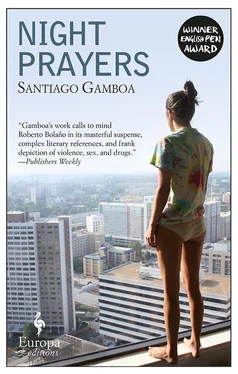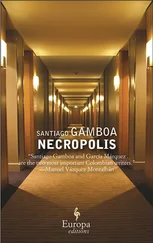To avoid visas, darling. You don’t go through the United States or through Europe, you see? A Schengen visa is very difficult to get, and as for the United States, forget it. This way you pass under the radar, if you see what I mean.
I thanked her and put the paper in my pocket. And when did you last hear of her?
The last time was when Maribel wrote to me from Tokyo saying she had arrived and that they were finding a place for her. That was a week after the flight, November 3, 2008. Up until then, I was responsible. From that point on, everyone makes their own life and doesn’t owe anyone an explanation, because we’re talking about adults here, free, independent adults, right? That was the last I heard. A month later I tried to talk to Maribel about another girl who wanted to go, but she took a long time to reply and then, three months later, she wrote and told me she was having legal problems and had to stop. I never heard any more after that.
I looked again at the photocopy of the ticket, and read my sister’s name about ten times. The letters danced in front of my eyes, I couldn’t believe it. At last I had something concrete. The former Miss Colombia stood up and went back to the bathroom. Again I heard two sniffs. Then she came out and said:
It’s possible your sister was arrested along with Maribel. That’s where you could start looking.
I asked her again if she had any contact information for Maribel in Colombia, but she said no. She didn’t even know her last name. Well, I said, you’ve been an enormous help, do I owe you anything? No, come on, said the former Miss Colombia. Go find your sister and when you’re with her tell her I miss her and she should give me a call.
When we said goodbye she gave me a kiss on the cheek.
I went back out on the street, feeling strange. Japan, Quito, what the hell did it all mean? I took the copy of the ticket from my pocket and made two photocopies in the stationery store. On the way home, I read it again at least a hundred times. At the traffic light on Eleventh, a couple looked at me in alarm from their car and I hid my face. I was crying.
When I got home, I locked myself in my room.
I switched on my computer and started searching: Japan, escorts, Colombian women in Japan. There were lots of names and telephone numbers, and I didn’t know what to do. I looked for the Colombian embassy in Japan and the Japanese embassy in Colombia. I copied down all the numbers, a very long list. Also the codes and the time difference. It was eight in the evening in Bogotá, nine the following morning in Tokyo. The timing was right, I was sure to get through. But I didn’t have any money. My heart was still pounding. When I went down to the living room I saw Father on the couch, with his head thrown back and a newspaper open on his lap. He was asleep. As soon as I took one step, he opened his eyes, are you going out at this hour? Yes, I said, and I need money. He looked at me in surprise. How much? About ten thousand pesos, I said. He pointed to his jacket and said, take it from my wallet. With the money in my hand I said goodbye. Thanks, Dad, I won’t be back late. He didn’t reply, but as soon as I opened the door I heard him from the living room, it isn’t to buy drugs, is it?
No, Dad. It isn’t for that. I swear.
That’s good, son. Take care.
I took a bus to the Church of Lourdes, because I’d seen a few call shops in the vicinity. I found one on Eleventh and asked how much it cost to call Tokyo. Seven hundred pesos for a minute. Hell, that’s expensive, I thought. I could only talk for about fifteen minutes. I went to one of the booths, dialed the number of the Colombian embassy, and waited. When the ringing started, my heart began pounding, and a drop of sweat ran down my back. Six rings, seven. They finally answered, and I explained that I was calling from Bogotá, that I had a sister who was lost in Japan, and gave the name and her identity card number. I was about to repeat it when a voice said, please hang on, I’ll put you through to the consulate; there was an internal switchboard noise, followed by some music by Vivaldi. I looked at the digital counter, three minutes and forty-six seconds, and then they answered at last, and I quickly explained that I was calling from Bogotá and that my sister was lost in Tokyo, and the name, and then the official said, can you repeat that, please? one moment, and left me waiting, and I looked at the counter, seven minutes and fifty seconds, my heart was stopping me from breathing, and then the man came back and said, no, there’s no record of anyone with that name, so I asked, what if she’s in prison? and they said, oh, one moment, and again Vivaldi, ten minutes and five seconds, more Vivaldi, twelve minutes and fifty seconds; the voice returned and said, no, there’s nobody registered under that name, all right, thanks, I said, and hung up, fourteen minutes and forty-eight seconds. I paid the ten thousand pesos and went out with my head about to burst.
I went up to Seventh and started walking back, looking at the expanse of the hills, the darker areas between the lights of the buildings and the lampposts, and I was filled with reproaches, questions, guilt: why didn’t you tell me? did you think I was going to judge you? do you think I’d have tried to stop you? It’s possible, it’s possible, where are you at this precise moment, while I’m walking along a horrible avenue filled with buses and vulgar people rushing along the sidewalks?
I got home at eleven. I didn’t want to meet Father in the living room, let alone Mother, so I made a few detours. I was grateful that he hadn’t asked me what the money was for. Ever since Juana had disappeared, he had become more generous toward me. Mother, on the other hand, continued with her suspicions and her silences, and those horrible ironic remarks of hers, a way of dealing with problems that consisted of not discussing them at the time, pretending they didn’t exist, and then bringing them out in front of other people and ridiculing Father. What most bothered me about her was her apparent insensitivity toward what had happened to Juana. I say apparent, Consul, because I’m giving her the benefit of the doubt, after all it was her eldest child, but the truth is, she didn’t give a damn, I’d even say she was pleased. That’s how she was, resentful and evil.
In my room, I went on the Internet and started to look at images of Tokyo: it seemed to me a strange, unreal city. Then I looked out at the night from my window. In Japan it was already the following day, which meant that Juana was in the future. She ran away to the future, I thought. She’s intelligent.
That was the moment, Consul, when I decided to go to Japan and look for her.
The next question, obviously, was, how to get there? Of course the decision was connected to another one, the decision to leave home forever. I couldn’t turn to Father, because if I did I’d have to tell him everything and hurt him even more. I felt that now was the moment, that, as they say in romantic stories, fate was knocking at my door. Knock, knock. The hour had come for me to go. Deciding to do so made me euphoric and I started with the most complicated thing. I took out Juana’s plane ticket, went on a website offering cheap flights, eDreams, and checked the fares. The journey from Bogotá—Juana’s was from Quito — would cost seven thousand dollars. In other words, to find her, I would need at least twice that. About fifteen thousand dollars, thirty million pesos, which was in the realm of fantasy, even for Father.
Where could I get hold of that kind of money? I fell asleep making calculations. Working and saving, it would take at least two years. Out of the question. Sell something? I had nothing of value. Rob? I couldn’t think whom. A sliver of an idea crossed my mind: Father worked in a bank, couldn’t I rob it? After all, Brecht taught us that it’s a worse crime to create a bank than to rob it. But these were idle thoughts, it would be like planting a dagger in Father’s heart, and he’d already been hurt enough.
Читать дальше












